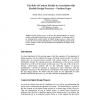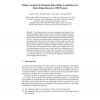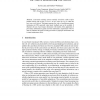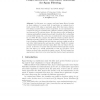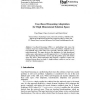ICCBR
2007
Springer
14 years 5 months ago
2007
Springer
In this position paper, we discuss the interdependencies of context models and flexible design processes in the chip industry. We illustrate this by an ontology-based context model...
ICCBR
2007
Springer
14 years 5 months ago
2007
Springer
Abstract. Creating case representations in unsupervised textual case-based reasoning applications is a challenging task because class knowledge is not available to aid selection of...
ICCBR
2007
Springer
14 years 5 months ago
2007
Springer
A knowledge-intensive case-based reasoning system has profit of the domain knowledge, together with the case base. Therefore, acquiring new pieces of domain knowledge should impro...
ICCBR
2007
Springer
14 years 5 months ago
2007
Springer
Abstract. Making case adaptation practical is a longstanding challenge for casebased reasoning. One of the impediments to widespread use of automated case adaptation is the adaptat...
ICCBR
2007
Springer
14 years 5 months ago
2007
Springer
Case-based reasoning systems routinely record the results of prior problem-solving, but not the provenance of new cases: the way in which the new cases were derived. This paper pro...
ICCBR
2007
Springer
14 years 5 months ago
2007
Springer
Current efficient planners employ an informed search guided by a heuristic function that is quite expensive to compute. Thus, ordering nodes in the search tree becomes a key issue,...
ICCBR
2007
Springer
14 years 5 months ago
2007
Springer
In this paper, we compare case-based spam filters, focusing on their resilience to concept drift. In particular, we evaluate how to track concept drift using a case-based spam fi...
ICCBR
2007
Springer
14 years 5 months ago
2007
Springer
Case-Based Reasoning (CBR) is a methodology that reuses the solutions of previous similar problems to solve new problems. Adaptation is the most difficult stage in the CBR cycle, e...
ICCBR
2007
Springer
14 years 5 months ago
2007
Springer
We identify two fundamental points of utilizing CBR for an adaptive agent that tries to learn on the basis of trial and error without a model of its environment. The first link co...
ICCBR
2007
Springer
14 years 5 months ago
2007
Springer
